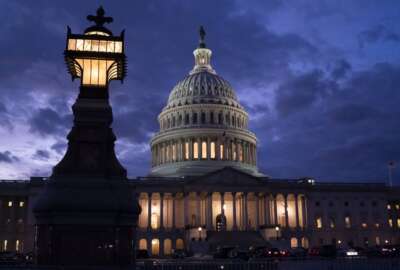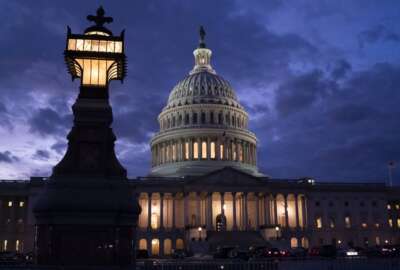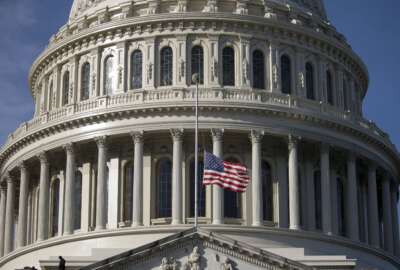Congress is on recess this week, as the February budget deadline looms
Budget reconciliation, administration nominations, and the looming appropriations deadline to get past a long continuing resolution. Those are all on the table for...
Best listening experience is on Chrome, Firefox or Safari. Subscribe to Federal Drive’s daily audio interviews on Apple Podcasts or PodcastOne.
Budget reconciliation, administration nominations, and the looming appropriations deadline to get past a long continuing resolution. Those are all on the table for Congress. But both chambers are in recess though. The Federal Drive with Tom Temin spoke with Bloomberg Government deputy news editor Loren Duggan.
Tom Temin: So Loren, does that mean nothing gets done? Or can things move along this week under the surface?
Loren Duggan: I think things will continue under the surface and leaders will be talking throughout this week to figure out how to move forward on all those issues you just mentioned. Top of mind, of course, is this annual spending bill process that has been stalled for most of the fiscal year already. We are on our second continuing resolution, this one goes till Feb. 18. They need to make some progress on this either with another short-term continuing resolution or the preference would be a spending bill that wraps the 12 regular bills together. So there were talks the last couple of weeks when members were in town. And those will undoubtedly continue.
Tom Temin: Yes, because this has been going on now at a low level, I guess for a couple of weeks now, this idea of, you would call that an omnibus?
Loren Duggan: That’s right, an omnibus or maybe mini buses as they like to call them with smaller packages of bills, depending on what makes sense as those talks come to a conclusion. But most of the discussion has been with the Big Four as they’re known. That’s the chairman and the ranking member of the House and Senate Appropriations Committee. So last week, for example, we had Patrick Leahy, who’s the Democratic chairman in the Senate, and Richard Shelby, who’s the Republican ranking member. Both say that they’re making some progress and that there’s some talks. Leahy was much more bullish thinking maybe they’d have an omnibus a few days after they get back on Jan. 31. Shelby wasn’t sure if that deadline was doable. We haven’t heard as much publicly from Rosa DeLauro and Kay Granger, those are the House chairman and ranking member. But they’re pretty key to this, and they have some big picture things to work out and then some smaller items to work out. Tends to be if the bigger things get solved then the smaller things might resolve themselves as well. But a few things to work through, including, the big one is how much to spend in total, how much to spend on the 12 bills, and then what rides along with the legislation when you’re at that point.
Tom Temin: Is there anything that could tilt this into a shutdown situation such as attaching Supreme Court packing to the appropriations bill?
Loren Duggan: I mean, there’s always something and one thing to remember, as we focused last week on the Senate’s rules and how many votes it takes to do something, this spending package needs the support of Republicans to get through the Senate, whether it’s a another continuing resolution, or it’s an omnibus or minibus. Because it would take 60 votes to cut off debate if you needed to do that. So Republicans do have leverage here, they can hold up this package if they don’t like elements that are in it, or if it’s missing something they really want. I think shutdowns are not popular most of the time. I don’t know that that’s where we’re headed. Obviously, with funding expiring, that is the natural course of events unless something else is signed into law. But they seem to be wanting to avoid that and have even, it’s even been said if they need more time and an omnibus to process it through the two chambers, there could be a continuing resolution to give them a few days or a week or whatever wiggle room. The ultimate fallback beyond that is the year-long CR, although we’ve seen a pressure campaign this year to avoid that, including a hearing from House appropriators where they heard from the Defense Department, and all the bad things that the Defense Department says would occur if there isn’t an adjustment to reflect to the Biden budget priorities and things like the NDAA that were signed into law.
Tom Temin: I guess if there was a short shutdown, then Verizon and AT&T could turn on the 5G ones, antennas right near the airports and get away with it since nobody there to watch. But that’s a long shot, I suppose. What about the budget reconciliation bill? What’s going on there? And there’s talk of, getting some of the seemingly doomed Build Back Better chunks into that.
Loren Duggan: The budget reconciliation bill, to me, it’s still alive. And the reason it is is because unlike the spending bill that you need 60 votes for, you only need 50 votes for this reconciliation bill because of the process they’re using for it. That’s a really attractive vehicle for Democrats who need to get some things across the line this year, so they can run on them in the fall. The question is what will go into that. The large Build Back Better package that we were talking about last year, that seems to have faltered. Joe Manchin wasn’t on board with that, he said before the holidays, but President Biden in his press conference last week said he hoped chunks of that could move. Now there’s a couple different things, you could put some of that in the reconciliation bill, you could find things that have more support and move it to a different piece of legislation, whatever the case may be, so there will continue to be discussions there. I don’t think they’re going to give up this vehicle though, because there are a lot of things that they want to do that have budgetary implications, that this vehicle is just a ripe opportunity to move. The child tax credit is still in the discussion. There are members who want the state and local tax deduction addressed. And then there’s the social spending programs and the climate change programs in there. Any of those could be, pretty big package to put into this legislation to move forward and Democrats are going to keep up the pressure on that. Maybe if it’s not the front of mind thing, they’re not going to give up on that opportunity.
Tom Temin: We are speaking with Loren Dugan, deputy news director at Bloomberg Government. And nominations—a pretty good few of them got through before this recess. And it looks like the Senate is finally kind of trying to clear that logjam. What can we expect when they do come back? Because they do have to be there for that one?
Loren Duggan: Yes, they have to be here for nominations. Those go through committee and get to the floor. Before leaving for this one-week recess, Chuck Schumer, the majority leader, set up votes on a number of nominations, both judicial and some executive ones as well to try and cycle through these votes as they come back. They only need 50 votes for those. Once you get cloture on them, it’s two hours and you vote on them. And so it’ll probably be a pretty quick process. And they could spend most of the week on that as they talk off the floor about these other issues. But I think we’ll continue to see when there’s not legislation to advance, Chuck Schumer making some dents into these different judicial, executive, ambassadorial nominations. There was a big movement before the end of the year to clear the decks of some of those and some deals were made to let State Department nominees go forward and things like that. So there’s the easy way to do these and then there’s the hard way. The hard way is to take up floor time, the easy way is to try to negotiate packages of nominees to move them forward. And that’s often going on behind the scenes and we just don’t see it until you know they’re ready to present it.
Tom Temin: And what about the nominees for the Merit Systems Protection Board, five years without a quorum and a couple of years with no members at all. What are they saying? Is that on this week’s agenda?
Loren Duggan: Those aren’t among the ones that Chuck Schumer filed for cloture on or to debate and have votes on the floor this week. There’s kind of a split decision on those. Some of the nominations that were made last year, approved by committee, remain on the Senate Calendar, but one of them was returned at the beginning of the year, as many nominees were because the natural state of affairs is nominees that aren’t acted on gets sent back. But there’s always a deal to keep some on the calendar. So there’s kind of a split decision on those. The person who would be the chairman and member of that board was sent back to the White House and the White House has already sent her back. So there could be more committee work on that and then come to the floor. So it remains to be seen how quickly they’ll act on that or will they wait to get the chairwoman out of committee and then go from there. So that’s one of those that’s kind of in this betwixt and between state for that board, which I know has been without a quorum, as you said, for a long time.
Tom Temin: And competitiveness legislation which has cleared the Senate. Is there a House version going on there?
Loren Duggan: There has been one under development for some time. And Nancy Pelosi said at a press conference last week that she thinks the House will have its version soon. The bill that came out of the Senate last year had a number of different provisions. It’s focused on competing with China in shoring up the supply chain, which has become an even deeper issue over the last few months since the Senate acted. The House has been working through its committees to try and come up with counterparts. And we may see a version of that in the near future that the House could maybe pass or then take to talks with the Senate to try and get a final version of that. That was something that was in the mix and NDAA last year, but they decided to pull it out of that process and look for something this year. But that could be a big bipartisan agreement if they got that because things like $52 billion for semiconductors, which is what the Senate signed off on, is something that could get a lot of bipartisan support and move forward either as part of that package or maybe get tacked on to one of these other vehicles. So that’s very much alive. We’re waiting to see what the details are though.
Tom Temin: Loren Dugan is deputy news director at Bloomberg Government. Thanks so much.
Loren Duggan: Thank you.
Copyright © 2025 Federal News Network. All rights reserved. This website is not intended for users located within the European Economic Area.
Tom Temin is host of the Federal Drive and has been providing insight on federal technology and management issues for more than 30 years.
Follow @tteminWFED






